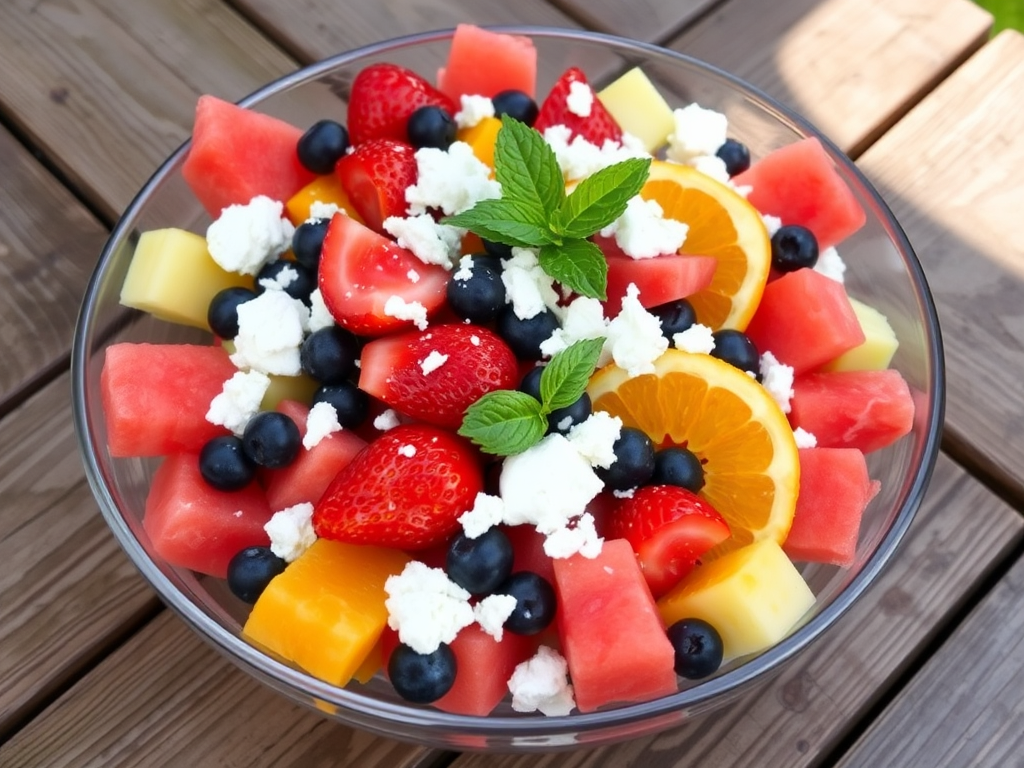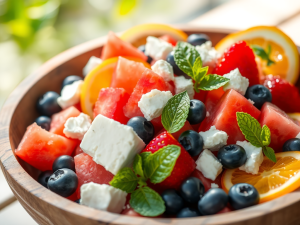
Greek cuisine is celebrated for its vibrant flavors, fresh ingredients, and healthy options. Among its many delights, Greek fruit salads stand out as a refreshing and nutritious choice, perfect for any occasion. This article delves deeper into the components, benefits, and variations of Greek fruit salads, as well as their cultural significance and tips for preparation.
The Essence of Greek Fruit Salads
Greek fruit salads typically showcase a variety of seasonal fruits, often enhanced with simple dressings or additional ingredients that highlight the natural flavors. The beauty of these salads lies in their versatility. They can be served as appetizers, side dishes, or even desserts. Common fruits used in these salads include:
- Watermelon: Juicy and hydrating, watermelon is a summer staple that adds sweetness and color.
- Feta Cheese: While not a fruit, the salty tang of feta adds a delightful contrast to the sweetness of fruits, creating a balanced flavor profile.
- Olives: Another non-fruit addition, olives introduce a savory element that complements the sweetness and adds depth.
- Citrus Fruits: Oranges and lemons provide acidity and brightness, elevating the overall taste.
- Berries: Strawberries, blueberries, and blackberries not only add color but also a burst of antioxidants and vitamins.
- Grapes: Sweet and crunchy, grapes are a favorite in many fruit salads and offer a satisfying texture.
Seasonal Variations
In Greece, fruit salads may vary with the seasons. In the summer, you might find refreshing salads featuring peaches, nectarines, and melons. In the fall, apples and pomegranates take center stage, while winter might bring citrus fruits like mandarins and grapefruits.
Health Benefits
Greek fruit salads are not only delicious but also packed with nutrients. Here are some health benefits:
- Rich in Vitamins: Fruits are an excellent source of vitamins A, C, and K, which support overall health, boost the immune system, and promote skin health.
- High in Antioxidants: Many fruits contain antioxidants that help combat oxidative stress and inflammation, reducing the risk of chronic diseases.
- Hydration: Fruits like watermelon and cucumber have high water content, making them great for hydration, especially in warm weather.
- Low in Calories: Naturally sweet and low in calories, fruit salads can be a satisfying yet light option for those watching their weight.
- Digestive Health: The fiber found in fruits aids digestion and promotes gut health, making fruit salads a beneficial choice.
Classic Greek Fruit Salad Recipe
Ingredients
- 2 cups of diced watermelon
- 1 cup of sliced strawberries
- 1 cup of halved grapes
- 1 orange, segmented
- 1 cup of blueberries
- 1/2 cup of crumbled feta cheese
- A handful of fresh mint leaves
- Juice of 1 lemon
- A drizzle of honey (optional)
Instructions
- Prepare the Fruits: Wash and dice all the fruits as needed. Combine them in a large bowl, ensuring the pieces are bite-sized.
- Add Feta and Mint: Gently fold in the crumbled feta cheese and torn mint leaves, which will add fragrance and a burst of flavor.
- Dress the Salad: Squeeze the lemon juice over the salad to enhance the flavors, and drizzle with honey if desired for added sweetness. Toss gently to combine, taking care not to mush the fruits.
- Serve: Chill for about 30 minutes before serving to allow the flavors to meld. This also helps to enhance the refreshing nature of the salad.
Variations to Try
- Tropical Twist: Incorporate pineapple, mango, and kiwi for a tropical flavor, perfect for summer gatherings.
- Nutty Delight: Add chopped nuts, like almonds or walnuts, for extra crunch and healthy fats, providing a satisfying texture contrast.
- Herbal Infusion: Experiment with other herbs, such as basil or thyme, for a unique twist that adds an aromatic layer to the salad.
- Spiced Up: Sprinkle a pinch of cinnamon or nutmeg for warmth, particularly delightful in fall fruit salads.
- Yogurt Dressing: Instead of lemon juice, use a light yogurt dressing, combining Greek yogurt with honey and a splash of vanilla for a creamy texture.
Cultural Significance
Fruit salads hold a special place in Greek culture, particularly during family gatherings, festivals, and celebrations. They symbolize abundance and the joy of sharing fresh, seasonal produce. In many Greek households, serving a fruit salad is a way to welcome guests and provide a light, refreshing option among heavier dishes.

Tips for Preparation
- Quality Ingredients: Always opt for the freshest, ripest fruits available. Seasonal produce not only tastes better but also maximizes nutritional benefits.
- Presentation: Use a large, beautiful bowl to showcase the colorful fruits. Garnishing with mint leaves or a sprinkle of nuts can elevate the visual appeal.
- Make Ahead: Fruit salads can be prepared a few hours in advance. However, if using delicate fruits like bananas or apples, consider adding them just before serving to prevent browning.
Conclusion
Greek fruit salads are a delightful way to enjoy the freshness of flavorful ingredients. They are easy to prepare, highly customizable, and make an excellent addition to any meal or gathering. Whether you stick to traditional recipes or venture into creative variations, these salads promise a burst of flavor and nutrition that everyone will love. So, grab some fresh fruits and get creative in the kitchen, celebrating the vibrant tastes of Greece.



